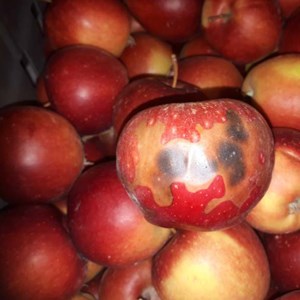Contact

Joakim Sjöstrand
Industrial PhD student at Äppelriket and SLU
joakim.sjostrand@slu.se

In a new doctoral thesis Joakim Sjöstrand has investigated how storage condition of Swedish apples can be improved. He found that the number of apples with soft scald can be decreased by reducing humidity and store the fruit in a controlled atmosphere. In addition, he found that apple ripeness can be tested with a tool called DA meter which proved to be a valuable complement to existing approaches.
Storing apples might seem like an easy task! You could perhaps keep some from your garden in a cellar a few months or buy some from a supermarket and keep them in a bowl on a table.
– Whatever form of storage you choose, you will find that at some point they will deteriorate. They may show signs of rot, lose flavour or develop an unappealing texture. This is because apples are not inanimate objects, but in fact are alive and breathing, meaning that the fruit keeps using up sugar as it becomes older and its defences against moulds present in the fruit become weaker, says Joakim Sjöstrand.
The reason for the apple tree to produce apples is to disperse seeds so that new trees can grow. There is no advantage to the tree in apples that keep for a long time, as it benefits only when the apple is eaten and the seeds are dispersed or the fruit flesh rots away so that the seeds reach the soil.
An apple that is ripening is actively ‘disassembling’ and becomes softer over time. In commercial storage of apples, the aim is to prolong the period in which the fruit is healthy and fresh. To successfully prolong the storage period, damage to the apple should be avoided, as this could be a source of infection. If apples are picked at the right time before the ‘disassembly’ process starts, they will keep for longer if stored in cold storage rooms.
If oxygen levels are kept low during storage, the fruit will respire more slowly, as both low oxygen and cold temperatures act to lower the respiration rate, and will remain healthy for longer. Factors during the growing period also affect how long apples can be stored. In particular, weather during the growing season affects fruit health, e.g. rainy weather helps some fungi to infect fruit and the fungus will then continue to grow in the storage room and spread to other fruit, causing rot.
Joakim started his thesis work with investigating soft scald, a physiological disorder in some apple cultivars, and fungal decay in apples during storage. Possible causes and ways to lower the level of soft scald and fungal decay were identified.
– I found that humidity was the factor that contributed most to development of soft scald. The most consistent measure for lowering the incidence of soft scald and fungal decay was to store the fruit in a controlled atmosphere, says Joakim.
Joakim also used a new tool for testing apple ripeness, the DA meter, and compared this method with other ripeness indices and tested its accuracy in predicting apple storability.
The aim was to develop ways to store Swedish apples for longer while maintaining high quality. The results indicated the accuracy of the DA meter varied from year to year, possibly due to seasonal weather conditions affecting apple maturation.
– Therefore, the AD cannot be used as a sole maturity assessment tool, replacing the indices currently used, but it could be a valuable complement to existing approaches. A DA meter can make large numbers of measurements and requires minimal training, so it could be used to check for differences between parts of an orchard and identify where to start harvesting, concludes Joakim.

Joakim Sjöstrand
Industrial PhD student at Äppelriket and SLU
joakim.sjostrand@slu.se
Read more about Joakim Sjöstrand's dissertation on the 17th of November here.
Read Joakim Sjöstrand's doctoral thesis "Swedish apples with IAD and improved storage conditions"